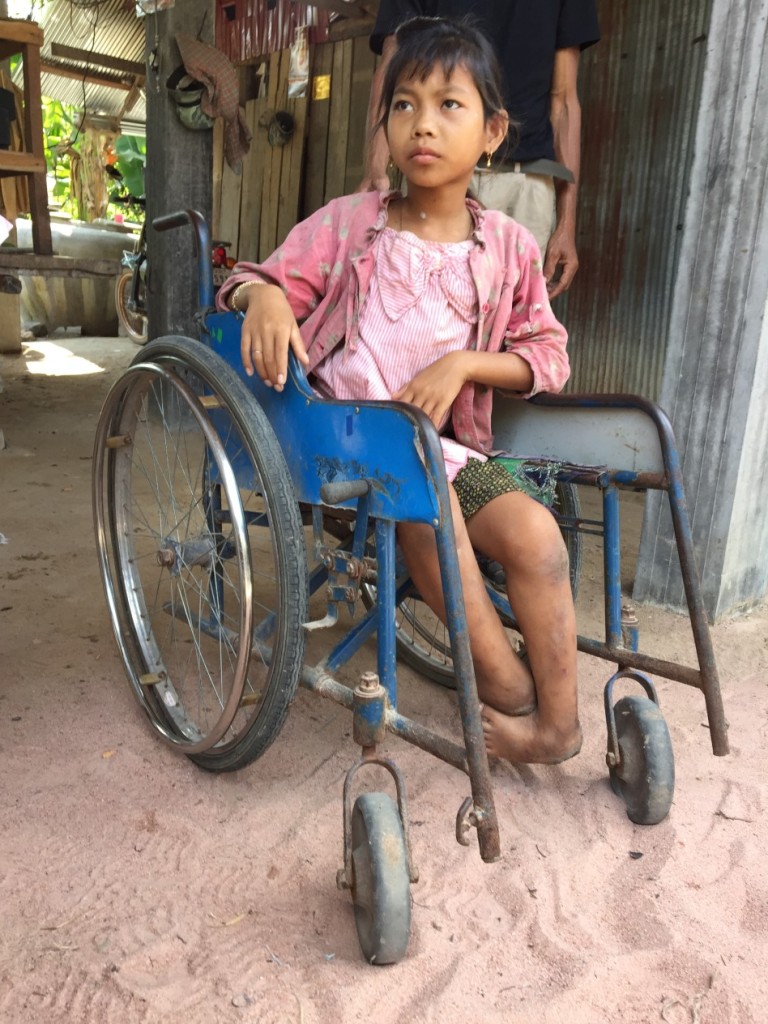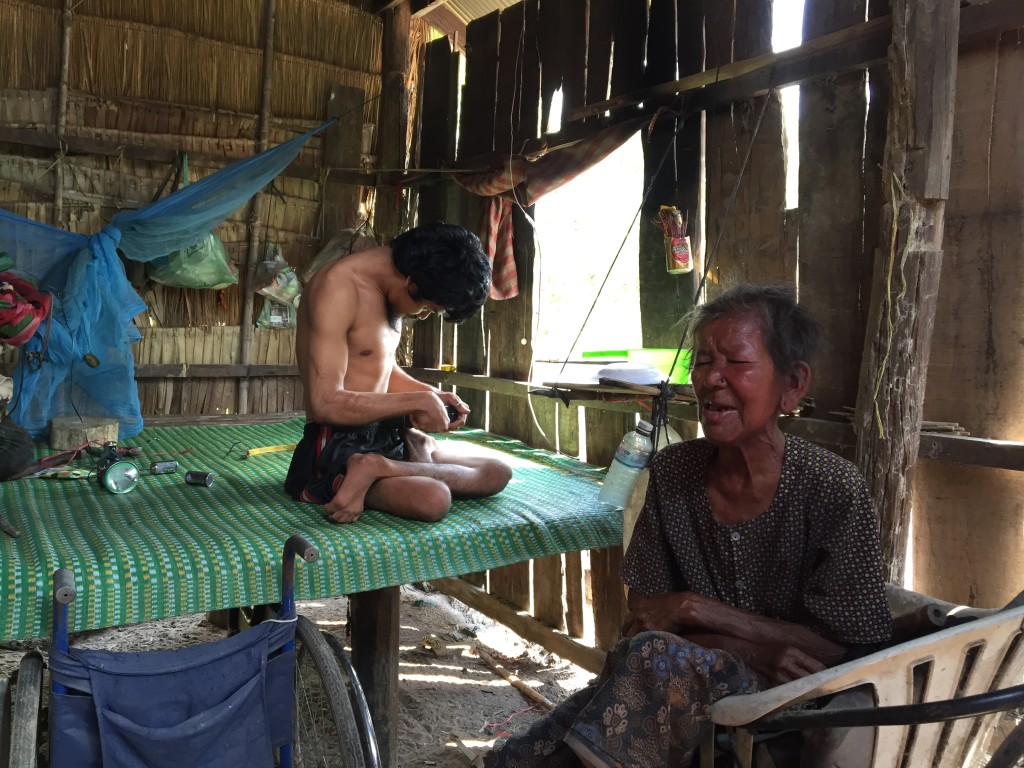Situation of Disabled People in Cambodia
In Cambodia nowadays there are many people of all ages and conditions with disabilities, living in every part of the country. Some have been disabled since they were born, and some were disabled after they were born due to certain circumstances such as road and land mine incidents, accidents, polio, stroke, and meningitis; and others are a result of the civil war and the Khmer Rouge regime that caused them permanent disability. Their disabilities have denied them the normal opportunities to live comfortably and improve their lives. Most of them are from poor families and live in rural areas of the country where there are no accessible facilities to assist them. As a result, more often they go out to beg money from people to feed themselves and their families.
Rehabilitation services are still limited in both the city and countryside, especially services that address the needs of children and women with disabilities. In addition, the financial means and the human resources to cope with the overwhelming needs of people with disabilities are still limited. There are a few NGOs that have been trying to assist persons with disabilities, but more support is in great need, especially financial aid and medical care. There are a few primary factors that really challenge persons with disabilities, including education, discrimination, employment, and, especially, accessibility.
Lack of education has become the main problem for people with disabilities in Cambodia nowadays, and that is the issue that needs an immediate solution. The limited capacity and resources of the general education system, especially in rural areas, has resulted in a majority of learners with disabilities being excluded from educational opportunities altogether. Special schools and schooling facilities for persons with disabilities are still in great need. Part of this problem is caused by the lack of financial resources of persons with disabilities and the expense of attending school such as money for the wheelchair, their study materials, school uniforms, and other expenses. The second part of the issue is transportation. The road conditions in Cambodia are very poor in both the city and, especially in rural areas, so it is difficult for children with disabilities to go to school. The distance from home to school, for most students, is long. No schools have facilities for people with disabilities. Also, support from the government for schooling of people with disabilities is very limited. All of these problems have become such a huge obstacle that prevent them (PWDs) from going to school and can cause them not to realize the importance of education. There are a few NGOs that have provided educational programs for, and helped assist, people with disabilities but support from NGOs is still inadequate to cover all the needs of persons with disabilities. All of these educational issues are very challenging for persons with disabilities, which in turn reduces their employment opportunities.
Thus, to respond to these issues, we people with disabilities have to coalesce to urge the government, especially the Ministry of Education, to take good care and have problems resolved in acceptable ways, to deeply understand what people with disabilities need, and to enforce the existing legislation and enact and write necessary laws that we, people with disabilities, think are helpful and appropriate for us.
Discrimination is another main problem that many people with disabilities have confronted. In Cambodia, most people are Buddhist and believe in Karma: Committing good, receives good, committing bad, receives bad; therefore, people with disabilities are believed to have done bad things in a previous life, so that is why they are disabled in the present life. As such, people with disabilities are often discriminated against, and shown little sympathy, by other people in society. Is this belief truly acceptable? People seem to be thoughtless and careless and have a negative perspective toward people with disabilities. They do not seem to seek the facts of what caused them (PWDs) to become disabled. They sometimes believe that people with disabilities are less important to society and the nation and this belief has caused great hardship to persons with disabilities.
As a result, belief in the abilities of people with disabilities is very low, and sometimes is not recognized publically and nationally. People with disabilities do not dare to go outside to become involved in the community and society in which they live, and most are reluctant and afraid to claim the equal benefits of a civilized society. To resolve this problem, we, representatives of people with disabilities, must gather together and encourage other persons with disabilities to come and be involved, to gather together and to show and tell the public that we want: equal rights and opportunities, and show that we also have great abilities to make meaningful contributions to society and the country.
Furthermore, the employment rate of people with disabilities is very low. The main issue is that the law related to employment of people with disabilities is not fully complied with and there are no penalties for non-compliance. There is a law stating that all businesses and enterprises must hire one person with disability in every hundred employees they have, and yet, no employers obey the law, for which they suffer no consequences. Also, discrimination and low educational skills are another reason why the employment rate is still on the ground floor. The labor market is very limited and people with disabilities, if they are hired to work, are very lowly paid, often not meeting the minimum expectations and needs of job seekers, especially in rural areas where economic activity is limited.
Finally, the Cambodian physical environment contains so many obstacles for people with disabilities. Public streets and roadways have no accommodation for persons with disabilities so getting around is dangerous at best; in many cases impossible. Almost all public places and buildings do not have any access for persons with disabilities. Even educational institutions do not provide access or facilities for students with disabilities, so this likely discourages them from studying. Most buildings have only stairs at the entrance gates, so how can a person with disabilities get into the office by himself or herself if he or she wants information or to work or seek accommodations there? Similar problems are seen in hospitals, schools, and institutions with multiple levels as they typically have several flights of stairs. This is because business owners disregard the law with impunity. There is a law stating that every business building must provide access for persons with disabilities, but the law is not fully obeyed.
In order to have all of these issues resolved, I and other persons with disabilities must go out to show people publically what we really need from employers or business owners and, especially, from the government. More importantly, we together will request the government to strongly and strictly enforce existing laws and regulations and enact further required legislation to improve the lives of people with disabilities of Cambodia. I am convinced that the time is right for persons with disabilities in Cambodia, and the organizations serving them, to coalesce to urge the government to action. In addition, skills training, income generation and job placement are important factors for vocational rehabilitation of people with disabilities. Therefore, the highest priority of society is to enable the disabled to gain an income for themselves and their families.


